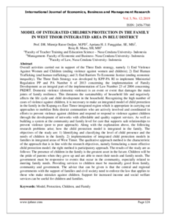Abstract
Overall activities carried out in support of the Three Ends strategy, namely 1) End Violence Against Women and Children (ending violence against women and children); 2) End Human Trafficking (end human trafficking); and 3) End Barriers To Economic Justice (ending economic inequality). The Three Ends Strategy was developed by KPP-PA RI to implement Ministerial Regulation PP and PA Number 6 of 2013 concerning the implementation of Family Development as an integral part of the implementation of Law Number 23 of 2004 concerning PKDRT. Domestic violence (domestic violence) is an event or event that damages the main joints of family resilience. This threatens the sustainability of household life and negatively affects the life cycle and child development in the household. Recognizing the high number of cases of violence against children, it is necessary to make an integrated model of child protection in the family in the Kupang-ex-East Timor integrated region which is appropriate in carrying out approaches to mobilize Belu district communities who are actively involved and coordinated in efforts to prevent violence against children and respond or respond to violence against children through the development of networks with affordable and quality support services. As well as building a system at the community and family level for care that supports safe relationships to prevent violence (peer to peer approach). Along with the explanation above, the following research problems arise; how the child protection model is integrated in the family. The objectives of the study are: 1) Identifying and classifying the level of child presence and the needs of children in the family. 2) implementation of integrated child protection models in families in integrated areas of West Timor. The qualitative approach method is the characteristic of the approach that is in line with the research objectives, namely formulating a more effective child protection model. the right method is participatory approach. The results of the study are as follows: The presence of children in the family is the greatest asset in the future. Children will be the pride of parents when they grow up and are able to meet their needs and family needs. The government must be responsive to events that occur in the community, especially related to meeting family needs. Providing services to children must be maximally good from family, community and government. The advice that can be given is that the central and regional governments with the support of families and civil society need to enforce the law that applies to those who make mistakes against children. Support for increased income and social welfare services can be useful for children and families.

